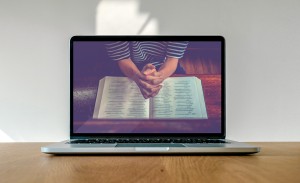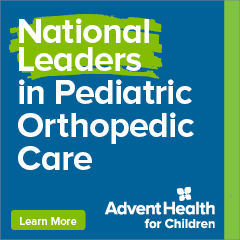Have Faith
Central Florida’s religious institutions work to create community amid a pandemic that has dispersed their congregations.
 Many synagogues, churches, temples and other religious centers have been sparsely populated or sitting empty since the pandemic began to spread through Central Florida.
Many synagogues, churches, temples and other religious centers have been sparsely populated or sitting empty since the pandemic began to spread through Central Florida.
But just because congregants aren’t filling the pews doesn’t mean the faithful have abandoned their practices. Instead, many congregations have embraced socially distanced ways of worshiping.
Such is the case at the Congregation of Reform Judaism, located in Fairview Shores, where Rabbi Steven Engel leads synagogue services online and outdoors with congregants sitting in their cars like they’re at a drive-in movie theater.
“We have had to rethink the way that we do everything,” he says.
That’s included the synagogue’s classes and activities, which have all gone virtual. To help older adults make the transition, the Congregation of Reform Judaism bought about 40 tablets and distributed them to congregates who either don’t have access to a computer or are not tech savvy.
Since the pandemic hit, Mount Zion Missionary Baptist Church, one of Orlando’s historical African American churches, has been using social media and Zoom video conferences to keep in touch with its congregation.
Reverend of the church, Robert M. Spooney, says the impact of physical separation on his congregation has been hard.
“For African Americans, church has always been more than a Sunday event,” he says. “It has not just been a part of life; church was central to life itself.”
President of the Sikh Society of Central Florida, Ishwar Singh says worship at the organization’s temple on Sunday often drew as many as 150 families but now people must watch the service from home, cutting them off from the communal experience of it all.
“Their social networking is gone now,” he says.
Religious Ceremonies
Special religious ceremonies such as marriages and funerals have also been affected by the coronavirus pandemic. Imam Tariq Rasheed, of the Islamic Center of Orlando, says the mosque has limited the size of its funerals.
“Traditionally the funeral prayers are held at the mosque and a big number of people attend, but in this pandemic funeral prayers are held with only close relatives and friends,” he says.
Meanwhile, marriages at the mosque are being held with only a couple of guests. Otherwise, people have postponed their ceremony or decided to hold it at home with only close family and friends.
Bar and bat mitzvahs are coming-of-age rituals for young people in the Jewish faith. When the pandemic hit, the Congregation of Reform Judaism postponed the ceremonies. However, the synagogue plans to begin celebrating these milestones once again in August in a limited way.
“We’re going to be putting up plexiglass on our pulpit to protect the people in the congregation,” Engel says. “We will have people required to wear masks and they will have to have assigned seats and there’ll be a maximum of 40 people in our whole sanctuary, which usually holds 400.”
Helping the Community
The pandemic has given rise to an unprecedented amount of need for local families struggling with financial loss and, subsequently, food insecurity and unstable housing situations. Religious institutions have long been the ones to step into help the needy and right now is no different.
At the Sikh Society of Central Florida, this has meant drive-thru food distribution on Sundays where families, both Sikh and not, are welcome to pick up free vegetarian meals.
“Everybody is welcome,” Singh says.
Mt. Zion Baptist Church has also been distributing food. The church recently sponsored a giveaway at a public school in Parramore, providing food to more than 600 families.
Turning to Faith
During times of struggle, people regularly seek out comfort in their faith. Priest Miguel Gonzalez of St. James Cathedral in Downtown Orlando says the pandemic has brought people who had strayed from their faith back to church.
“It’s been moving to see people that have been away from the church for many, many years and they have come back,” he says. “So, some good comes out of evil.”
Many people of faith have also turned to their religious texts for guidance during this confusing and stressful time. Rabbi Engel says he’s talked with many congregants about what Judaism’s religious texts say about the intersection of health and faith.
“We’ve also spoken about the responsibility that we have to other people, that wearing a mask is not for you but it’s for others,” he says. “Religious passages, such as ‘Do not stand idle while your neighbor bleeds. You are to not oppress the widow, the orphan, the stranger.’ In other words, you’re supposed to take care of those who are most vulnerable in society.”
Gonzalez agrees. “Everyone has to get involved in safeguarding the well-being of our neighbors, of our families and friends, and even of ourselves,” he says. “So how important it is for us to be mindful of that responsibility that God places before us.”
For those seeking strength right now, Rev. Spooney says he’s been sharing the Bible passage Psalm 46:1-2 with them, which says, in part, “We should remember that we do not face the situation alone, but with God’s presence and help.”
Imam Rasheed has also been encouraging members of his mosque to keep faith, especially when things are hard.
“God has made the world such that after hard times comes easy times,” he says. “Nearly all of us are going through tough times emotionally and financially but this time will finish very soon and the sun of comfort will shine upon all of us again.”
This article originally appeared in Orlando Family Magazine’s August 2020 issue.









